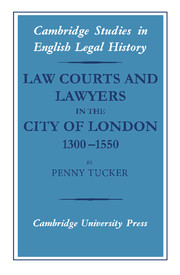Book contents
- Frontmatter
- Contents
- Acknowledgements
- List of abbreviations
- List of figures
- Introduction
- 1 The administration of the law by the city in context
- 2 The distinctiveness of city law and custom
- 3 The city law courts
- 4 The administration of the law in the city's courts: I
- 5 The administration of the law in the city's courts: II
- 6 Judges, jurors and litigants
- 7 The city's law officers
- 8 Legal representation in the city
- 9 The effectiveness of the administration of the law by the city
- 10 Interchange and exchange between the city and the common law
- Appendices
- Bibliography
- Index
9 - The effectiveness of the administration of the law by the city
Published online by Cambridge University Press: 04 August 2010
- Frontmatter
- Contents
- Acknowledgements
- List of abbreviations
- List of figures
- Introduction
- 1 The administration of the law by the city in context
- 2 The distinctiveness of city law and custom
- 3 The city law courts
- 4 The administration of the law in the city's courts: I
- 5 The administration of the law in the city's courts: II
- 6 Judges, jurors and litigants
- 7 The city's law officers
- 8 Legal representation in the city
- 9 The effectiveness of the administration of the law by the city
- 10 Interchange and exchange between the city and the common law
- Appendices
- Bibliography
- Index
Summary
INTRODUCTION
Since the nature and variety of legal remedies offered by the city's courts, and the process employed for each of them, have already been described, it is the implications of these remedies and processes for litigants, and consequently how attractive the city is likely to have been as a place in which to litigate, which are of interest here. Likewise, as far as the city's own priorities are concerned, its effectiveness in protecting its jurisdiction and citizens against adverse intervention by national authorities has also been described and discussed, as has been its ability to influence those authorities. It is however also clear from the letters which survive in the early plea and memoranda rolls, in particular, that the city's governors engaged in a considerable amount of correspondence with important individuals and with other towns and local authorities, both on the city's behalf and, where necessary, on behalf of its citizens. Unfortunately, in later years this type of correspondence seems normally to have been recorded and held elsewhere, and much has probably been lost. The probability is, nevertheless, that within England changes in the relationship between local and central courts and the greater willingness of the larger local courts to entertain suits brought by outsiders meant that the need for such ad hoc interventions had reduced by the end of the fourteenth century.
- Type
- Chapter
- Information
- Law Courts and Lawyers in the City of London 1300–1550 , pp. 314 - 349Publisher: Cambridge University PressPrint publication year: 2007



